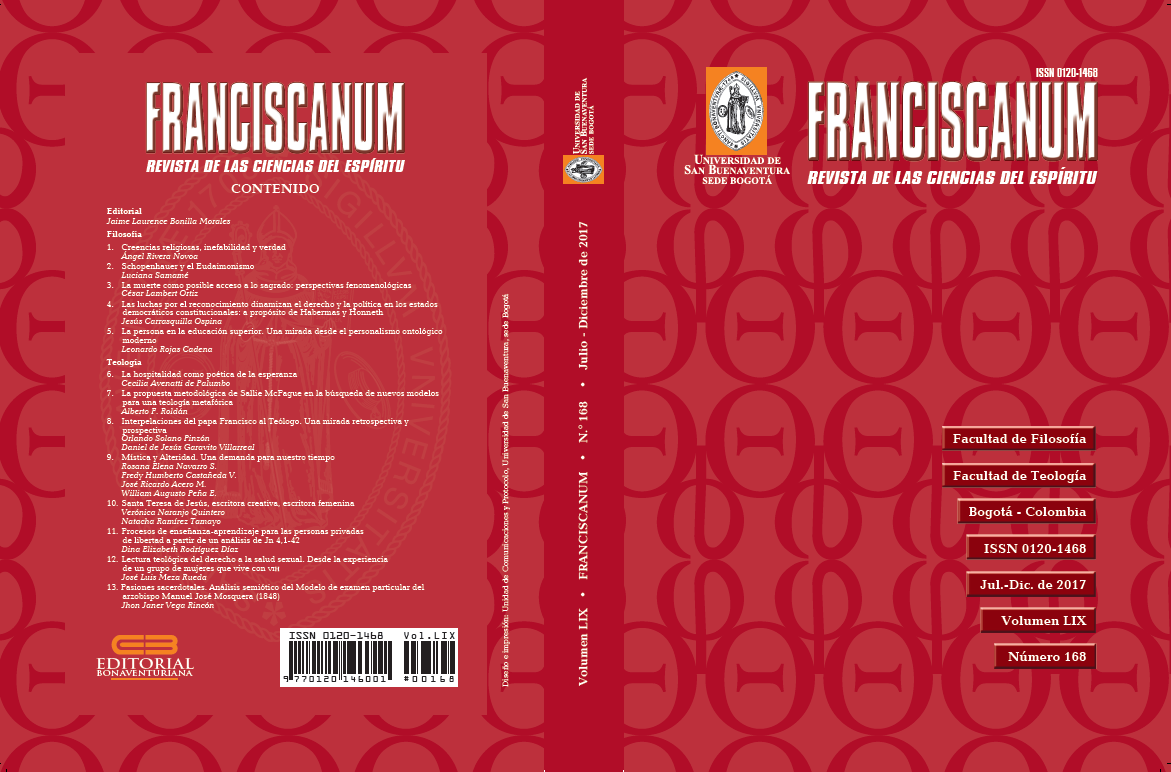This journal provides immediate open access to its content, based on the principle that giving the public free access to research helps a greater global exchange of knowledge.
Therefore, the Creative Commons 4.0 Attribution Attribution - Equal Share (by-sa) License is accepted: The commercial use of the work and the possible derived works is permitted, the distribution of which must be done with a license equal to that regulates the original work.
http://creativecommons.org/licenses/by-sa/4.0/
Along these same lines and in line with the Open Access policy, it is clarified that the authors maintain their rights to articles, without restrictions and, in the same way, they maintain their publication rights, without restrictions. They are only asked to reference the number of the Franciscanum magazine where the article initially appeared.
Abstract
References
Annas, Julia. «Ancient Ethics and Modern Morality». Philosophical Perspectives Vol. 6 (1992): 119-136.
Aristóteles. Ética nicomáquea. Madrid: Planeta–DeAgostini, 1997.
Atwell, John. Schopenhauer. The Human Character. Philadelphia: Temple University, 1990.
Hobbes, Thomas. Leviatán. Barcelona: Altaya, 1997.
Cartwright, David. «Schopenhauer as Moral Philosopher. Towards the actuality of his ethics». Schopenhauer–Jahrbuch 70 (1989): 54-65.
Irwin, Terence. The Development of Ethics. A Historical and Critical Study. Volume iii: From Kant to Rawls. Oxford: Oxford University, 2009.
Kant, Immanuel. Crítica de la razón práctica. Buenos Aires: Losada, 2007.
Kant, Immanuel. Fundamentación de la metafísica de las costumbres. Madrid: Tecnos, 2005.
Nietzsche, Friedrich. La genealogía de la moral. Madrid: Alianza, 2002.
Platón. Banquete. Madrid: Gredos, 1993.
Platón. La república. Madrid: Alianza, 1988.
Schopenhauer, Arthur. Parerga y paralipómena ii. Madrid: Trotta: 2009.
Schopenhauer, Arthur. El mundo como voluntad y representación. Vol. i y ii. Madrid: fce, 2005.
Schopenhauer, Arthur. «Sobre el fundamento de la moral». En Los dos problemas fundamentales de la Ética. Madrid: Siglo xxi, 2002.
Schopenhauer, Arthur. Manuscript Remains. Volume 3. Editado por Arthur Hübscher. Oxford: Berg Publishers, 1989.
Slote, Michael. «Law, Virtue and Justice». En Law, Virtue and Justice. Editado por A. Amaya y Ho Hock Lai, 279-292. Oregon: Hart Publishing, 2013.
Wicks, Robert. Schopenhauer. Singapore: Blackwell Publishing, 2008.
Williams, Bernard. Ethics and the Limits of Philosophy. Abigdon: Routledge, 2006.
Williams, Bernard. «Philosophy». En The Legacy of Greece. Editado por M. Finley, 202-255. Oxford: Clarendon, 1981.
Wood, Allen. «Kant versus Eudaimonism». En Kant´s Legacy: Essays in Honor of Lewis White Beck. Editado por Predrag Cicovacki, 261-281. Rochester: University of Rochester, 2001.



















